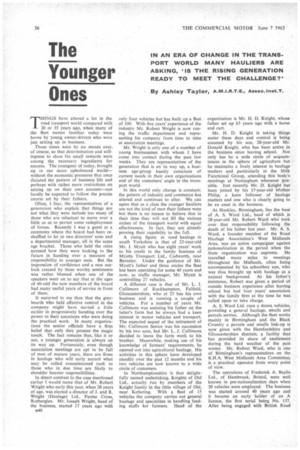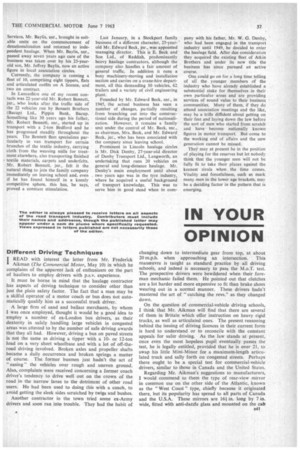The
Page 58

Page 59

If you've noticed an error in this article please click here to report it so we can fix it.
Younger
Ones
THINGS have altered a lot in the road transport world compared with 30 or 35 years ago, when many of the fleet names familiar today were borne by young owner-drivers who were just setting up in business.
Those times were by no means easy, of course, so that determination and willingness to slave for small rewards were among the necessary ingredients for success. The youngster of today, brought up in our more upholstered world— without the economic pressures that once dictated the pattern of business life and perhaps with rather more restrictions on setting up on their own account—can hardly be expected to follow the precise course set by their fathers.
Often, 1 fear, the representatives of a generation who explain that things are not what they were include too many of those who are reluctant to move over a little so as to permit some redeployment of forces. Recently I was a guest at a ceremony where the board had been reshuMed to let in two directors' sons and a departmental manager, all in the same age bracket. Those who held the reins stressed how they were looking to the future in handing over a measure of responsibility to younger men. But the impression of confidence and a new outlook created by these worthy sentiments was rather blunted when one of the speakers went on to say that at the ages of 40-odd the new members of the board had many useful years of service in front of them.
It occurred to me then that the greybeards who held effective control in the company might have started a little earlier in progressively handing over the power to their associates who were doing the practical work. In many organizations the senior officials have a firm belief that only they possess the magic touch. The fact remains that, like it or not, a younger generation is always on its way up. .Fortunately, even though association meetings are apt to be full of men of mature years, there are firms in haulage who will early accord what may be called commissioned rank to those who in due time are likely to shoulder heavier responsibilities.
In direct contrast to the case mentioned earlier I would name that of Mr. Robert Wright who early this year, when 20 years of age, was elected a director of J. and R. Wright (Haulage) Ltd., Farme Cross, Rutherglen. Mr. Joseph Wright, head of the business, started 17 years ago with B40 only four vehicles but has built up a fleet of 100. With five years' experience of the industry Mr. Robert Wright is now runing the traffic department and representing his company from time to time at association meetings.
Mr. Wright is only one of a number of young businessmen with whom 1 have come into contact during the past few weeks. They are representatives of the generation that is on its way up, a business age-group keenly conscious of current needs in their own organizations and of the customers' angle in the transport world.
In this world only change is constant; the pattern of industry and commerce has altered and continues to alter. We can agree that as a class the younger hauliers are not the kind of men their fathers were but there is no reason to believe that in their time they will not fill the various niches of the transport world with equal effectiveness. In fact, they are already proving their capability to the full. • A rising figure in road haulage in south Yorkshire is that of 23-year-old Mr. I. Myatt who has eight years' work to his credit in the family business of Myatts Transport Ltd., Cudworth, near Barnsley. Under the guidance of Mr. Myatt's father and three uncles the fleet has been operating for some 40 years and now, as traffic manager, Mr. Myatt is controlling 27 vehicles.
A different case is that of Mr. L. J. Cullimore of Rockhampton, Falfield, Gloucestershire, who at 25 has his own business and is running a couple of vehicles. For a number of years Mr. Cullimore was assisting his father on the latter's farm but he always had a keen interest in motor vehicles and transport. The expected sequel of the retirement of Mr. Cullimore Senior was his succession by his two sons, but Mr. L. J. Cullimore decided to leave the farm work to his brother. Meanwhile, making use of his knowledge of farmers' requirements, he opened out into agricultural haulage. His activities in this sphere have developed steadily over the past 12 months and his two vehicles are now known to a wide circle of customers.
In Northamptonshire is that delightfully named undertaking, Knights of Old Ltd„ actually run by members of the Knight family in the little village of Old, near Kettering. With a fleet of 15 vehicles the company carries out general haulage and specializes in handling feeding stuffs for farmers. Head of the organization is Mr. H. D. Knight, whose father set up 65 years ago with a horse and cart.
Mr. H. D. Knight is taking things easier these days and control is being assumed by his son, 28-year-old Mr. Donald Knight, who has been active in the business since leaving school. Not only has he a wide circle of acquaintances in the sphere of agriculture but he maintains a lively interest in haulage matters and particularly in the Milk Functional Group, attending this body's meetings at Nottingham whenever possible. Just recently Mr. D. Knight has been joined by his 17-year-old brother Philip, a keen follower of haulage matters and one who is clearly going to be an asset in the business.
At Hockley, Birmingham, lies the base of A. S. Ward Ltd., head of which is 28-year-old Mr. Robert Ward who took over that responsibility following the death of his father last year. Mr. A. S. Ward, a founder member of the Road Haulage Association's West Midlands Area, was an active campaigner against nationalization in the period when the State organization was supreme. He travelled many miles to meetings throughout the Midlands, often being accompanied by his schoolboy son, who was thus brought up with haulage as a natural background. At his father's insistence, Robert was given a period of outside business experience after leaving school but had four years' association with the family firm at the time he was called upon to take charge.
A. S. Ward Ltd. runs a dozen vehicles, providing a general haulage, smalls and parcels service. Although the fleet works mainly in Birmingham and the Black Country a parcels and smalls link-up is now given with the Herefordshire and Gloucestershire districts, a facility that has provided its share of excitement during the hard weather of the past winter. Mr. Robert Ward, who is one of Birmingham's representatives on the R.H.A. West Midlands Area Committee, is a -practical operator from every point of view.
The operations of Frederick A. Baylis Ltd., of Hambrook, Bristol, were well known in pre-nationalization days when 30 vehicles were employed. The business was started around 40 years ago and it became an early holder of an A licence, the first serial being No. 157. After being engaged with British Road Services, Mr. Baylis, snr., brought in suitable units on the commencement of denationalization and returned to independent haulage. When Mr. Baylis, snr., passed away seven years ago care of the business was taken over by his 25-yearold son, Mr. Jeffrey Baylis, now an active figure in local association circles.
Currently, the company is running a fleet of 10, comprising eight tippers, flats and articulated outfits on A licence, and two on contract.
In Lancashire one of my recent contacts was 22-year-old Mr. Robert Bennett, jnr., who looks after the traffic side of the 22 vehicles run by Bennett Brothers (Bacup) Ltd., Pippin Bank, Bacup. Something like 30 years ago his father, Mr. Robert Bennett, snr., started up in transport with a 2-ton Bedford and he has progressed steadily throughout the years. The Bennett fleet specializes particularly in van transport for certain branches of the textile industry, carrying cloth from the weaving mills for treatment elsewhere, also transporting finished textile materials, carpets and underfelts. Mr. Robert Bennett, jnr., felt it the natural thing to join the family company immediately on leaving school and, even if he has found himself in a keenly competitive sphere, this has, he says, proved a constant stimulation. Last January, in a Stockport family business of a different character, 25-yearold Mr. Edward Beck, jnr., was appointed managing director. This is E. Beck and Son Ltd., of Reddish, predominantly heavy haulage contractors, although the company also handles a fair amount of general traffic. In addition it runs a busy machinery-moving and installation section and carries on a crane-hire department, all this demanding 50 vehicles, 62 trailers and a variety of civil engineering plant.
Founded by Mr. Edward Beck, snr., in 1945, the actual business has seen a number of changes, partially resulting from branching out into the constructional side during the period of nationalization. However, it remains a family unit under the control of Mr. Beck, snr., as chairman, Mrs. Beck, and Mr. Edward Beck, jnr., who has been associated with the company since leaving school.
Prominent in Lincoln haulage circles is Mr. Dick Denby, 27-year-old director of Denby Transport Ltd., Langworth, an undertaking that runs 20 vehicles on general and long-distance haulage. Mr. Denby's main employment until about two years ago was in the tyre industry, where he acquired a useful background of transport knowledge. This was to serve him in good stead when in corn pany with his father, Mr. W. G. Denby, who had been engaged in the transport industry until 1949, he decided to enter the haulage field. After due consideration they acquired the existing fleet of Atkin Brothers and under its new title the business has since pursued an active course.
One could go on for a long time telling of all the younger members of the industry who have already established a substantial stake for themselves in their own particular areas and are providing services of sound value to their business communities. Many of them, if they do attend association meetings and the like, may be a trifle diffident about getting on their feet and laying down the law before the sort of men who started from scratch and have become nationally known figures in motor transport. But come to the working end of affairs and the new generation cannot be missed.
They may at present be in the position of playing for the reserves but let nobody think that the younger men will not be fully fit to take their places against the keenest rivals when the time comes. Vitality and forcefulness, such as mark many men in the lower age brackets, may be a deciding factor in the pattern that is emerging.




































































































